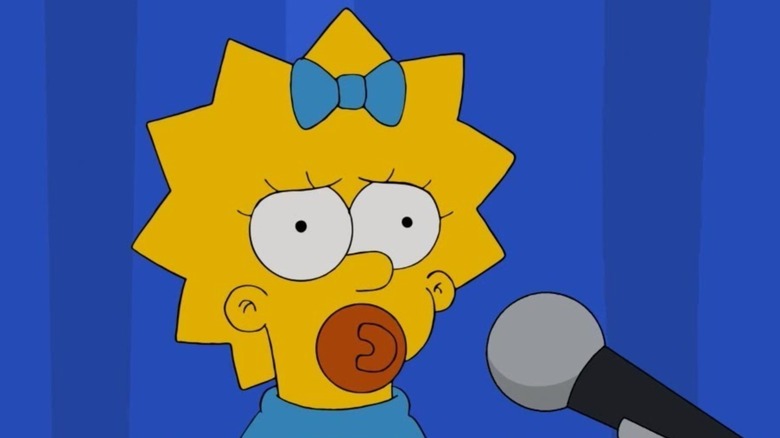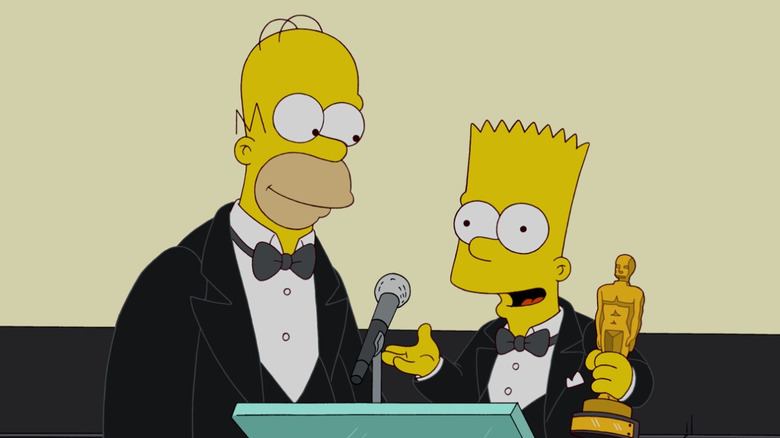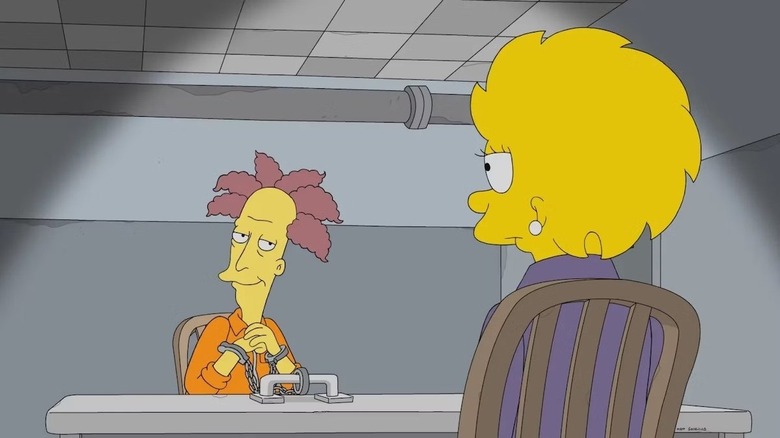One Mostly Silent Character On The Simpsons Has Been Voiced By Three Different Oscar Nominees
"The Simpsons" gets a lot of mileage out of its voice actors. Seriously, it feels like half of Springfield is voiced by Hank Azaria, Harry Shearer, or Tress MacNeille. Despite the numerous cases of voice actors doubling up, each character in the cast sounds unique and immediately recognizable. Even Maggie Simpson, the perennial infant who never says a word, has her distinctive pacifier sound.
Most of Maggie's baby sounds are provided by Nancy Cartwright (whose primary "Simpsons" is playing Maggie's older brother Bart). On the rare occasions where Maggie does do more than squeal or suck on her binky, the show has brought out some big acting guns.
In season 2's "Bart vs Thanksgiving," Bart imagines his family being angry with him; Maggie declares, "It's your fault I can't talk!" That one line was provided by none other than an uncredited Carol Kane (who these days is rocking it as Pelia on "Star Trek: Strange New Worlds").
Then, the season 4 episode "Lisa's First Word" ends with Maggie's first word ("Daddy") — but neither her parents nor siblings are around to hear it. "The Simpsons" got an even bigger guest star to play Maggie in that episode: Hollywood legend Elizabeth Taylor.
Much later, "The Simpsons" season 20 anthology episode "Four Great Women and a Manicure" caps itself off with "Maggie Roark," parodying "The Fountainhead" by Ayn Rand (ugh). Maggie's preschool teacher discourages how she plays with her building blocks, so she gives an impassioned speech before her class about why she refuses to conform. Maggie's (fully developed adult voice) is supplied by Jodie Foster.
Quite an impressive collection of actresses, huh? The Oscars would certainly agree.
Maggie Simpson, Oscar winner?
"The Springfield Confidential" by former "Simpsons" showrunner Mike Reiss (co-authored with Mathew Klickstein) turns the number of Oscars between Maggie Simpson's voice actresses into a trivia question. The answer? Four wins and 11 nominations between Taylor, Kane, and Foster. (When Reiss wrote the book, it was only 10 nominations. Can you guess what changed?)
Kane is the only non-winner between these three. However, she did get one nomination for Best Actress in 1976. The film was "Hester Hall," a drama about Jewish-American immigrants in 1890s New York City.
The four Best Actress wins are split evenly between Taylor and Foster. The former won first in 1961 (for "Butterfield 8"). Taylor had been nominated each of the previous three years ("Raintree Country" in 1958, "Cat on A Hot Tin Roof" in 1959, and "Suddenly, Last Summer" in 1960). After that run, the Academy probably felt she'd earned the crowd. Her next win was in 1967 for "Who's Afraid of Virginia Woolf" (which /Film named the best Liz Taylor film ever). Based on Edward Albee's 1962 play, "Woolf" is about the dissolution of a middle-aged marriage; Taylor's onscreen husband was her real one Richard Burton (they married and divorced twice in their lives).
Jodie Foster has played everyone from Clarice Starling to Maggie Simpson
Jodie Foster got her first Oscar nomination for Best Supporting Actress in 1977 — at age 15 — for her role in "Taxi Driver." It took 12 more years for her to win, though, which she did in 1989 for "The Accused." In 1992, she won again for playing Clarice Starling in "Silence of the Lambs." That movie in general swept the Oscars, but Foster wasn't simply riding the wave; her performance as Clarice is one of the best movie heroines ever. (Anthony Hopkins' also Oscar-winning performance as Hannibal Lecter wouldn't be half as memorable if he didn't have a proper foil.)
Foster was later nominated for Best Actress in 1995 for "Nell" (about a former feral child introduced into society as an adult). After an almost three-decade hiatus, she recently got a Best Supporting Actress nomination for "Nyad" — that's the nomination that hadn't happened yet when "The Springfield Confidential" was published.
Will the number rise any further? Stay tuned.


